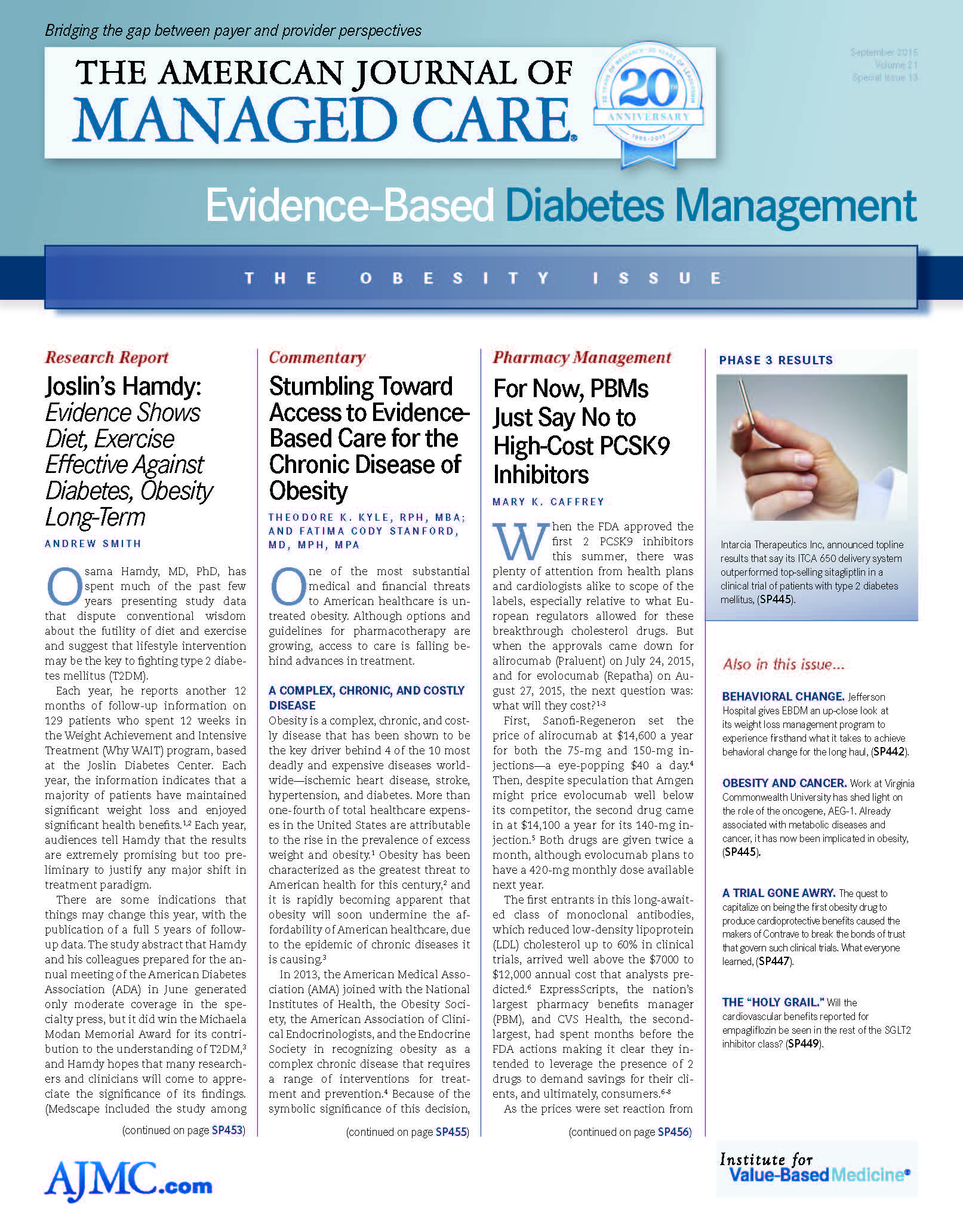- Center on Health Equity & Access
- Clinical
- Health Care Cost
- Health Care Delivery
- Insurance
- Policy
- Technology
- Value-Based Care
Empagliflozin Is First Diabetes Drug to Hit "Holy Grail" of Cutting Heart Attack, Stroke Deaths in Clinical Trial
The SGLT2 inhibitor empagliflozin, marketed as Jardiance, became the first of the newer diabetes drugs to reduce the risk of heart attacks and stroke deaths in a clinical trial,1 an achievement that a leading researcher recently said would be the “holy grail” of such drugs.
Eli Lilly and Company and Boehringer Ingelheim released topline results on August 20, 2015, for the EMPA-REG OUTCOME trial, which will be presented September 17, 2015, at the European Association for the Study of Diabetes in Stockholm, Sweden.1 The results marked the first time that one of the newer class of antidiabetes drugs has been shown to not only have no adverse cardiovascular effects while helping patients achieve glycemic control, but the drug also had a cardioprotective effect.
Empagliflozin was approved by the FDA a year ago, after competitors that include Johnson and Johnson’s canagliflozin, sold as Invokana.2,3 The results raise the possibility that other drugs in the sodium glucose cotransporter-2 (SGLT2) class could produce similar benefits. SGLT2 inhibitors work by blocking the SGLT2 protein, which would typically reabsorb glucose. Thus, sugar is expelled through the urine, lowering blood sugar levels in the body.
The drug class is known to have benefits for hypertension, and patients have seen modest weight loss In their announcement, Lilly and Boehringer said the study included 7000 patients with type 2 diabetes mellitus (T2DM) who were considered at high risk for heart attacks or strokes. Those taking the therapy saw significantly fewer cardiac deaths, nonfatal heart attacks, and nonfatal strokes when taking empagliflozin, in combination with standard therapy, than those patients taking standard therapy alone, which included statins and drugs for blood pressure. Patients were followed for an average of 3.1 years.1
Since the mid-2000s, the FDA has required newer diabetes therapies to be studied after approval through longer term cardiovascular outcomes trials. This is done to ensure that there are no repeats of the Avandia saga; FDA had to highly restrict sales of this drug after a study in the New England Journal of Medicine indicated it increased heart attack risk.4
Two such cardiovascular outcomes trials were presented during the 75th Scientific Sessions of the American Diabetes Association in June. At the presentation of the ELIXA trial on lixisenatide—which found no cardiovascular (CV) risk or benefit—Yale Diabetes Center’s Silvio E. Inzucchi, MD, said that if a therapy were ever developed that actually improved CV outcomes, “then we would have achieved the holy grail.”4
References
1. Jardiance demonstrated cardiovascular (CV) risk reduction in people with type 2 diabetes at high risk for CV events [press release]. http://www.prnewswire.com/news-releases/jardiance-demonstrated-cardiovascular-cv-risk-reduction-in-people-with-type-2-diabetes-at-high-risk-for-cv-events-300131117.html. Indianapolis, IN: PRNewswire; August 20, 2015.
2. FDA approves Jardiance to treat type 2 diabetes [press release]. http://www.fda.gov/NewsEvents/Newsroom/PressAnnouncements/ucm407637.htm. Silver Spring, MD: FDA newsroom; August 1, 2014.
3. FDA approves Invokana to treat type 2 diabetes [press release]. http://www.fda.gov/NewsEvents/Newsroom/PressAnnouncements/ucm345848.htm. Silver Spring, MD: FDA Newsroom; March 29, 2013.
4. Caffrey MK. ELIXA trial results find no cardiac benefit, risk for lixisenatide. Conference Coverage, 75th Scientific Sessions of the American Diabetes Association. American Journal of Managed Care website. http://www.ajmc.com/conferences/ADA2015/elixa-trial-results-find-no-cardiac-risk-benefit-for-lixisenatide. Published June 9, 2015. Accessed August 21, 2015.

Quality of Life: The Pending Outcome in Idiopathic Pulmonary Fibrosis
February 6th 2026Because evidence gaps in idiopathic pulmonary fibrosis research hinder demonstration of antifibrotic therapies’ impact on patient quality of life (QOL), integrating validated health-related QOL measures into trials is urgently needed.
Read More
Exploring Pharmaceutical Innovations, Trust, and Access With CVS Health's CMO
July 11th 2024On this episode of Managed Care Cast, we're talking with the chief medical officer of CVS Health about recent pharmaceutical innovations, patient-provider relationships, and strategies to reduce drug costs.
Listen
Building Trust: Public Priorities for Health Care AI Labeling
January 27th 2026A Michigan-based deliberative study found strong public support for patient-informed artificial intelligence (AI) labeling in health care, emphasizing transparency, privacy, equity, and safety to build trust.
Read More

